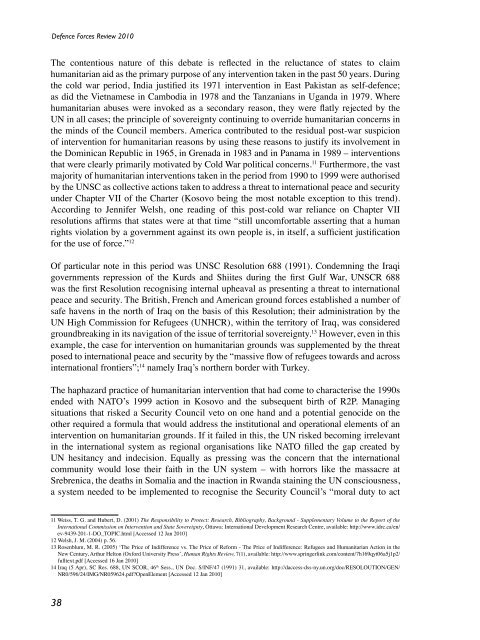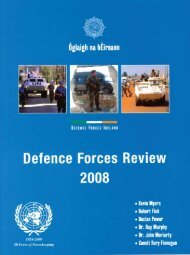Defence Forces Review 2010
Defence Forces Review 2010
Defence Forces Review 2010
You also want an ePaper? Increase the reach of your titles
YUMPU automatically turns print PDFs into web optimized ePapers that Google loves.
<strong>Defence</strong> <strong>Forces</strong> <strong>Review</strong> <strong>2010</strong>The contentious nature of this debate is reflected in the reluctance of states to claimhumanitarian aid as the primary purpose of any intervention taken in the past 50 years. Duringthe cold war period, India justified its 1971 intervention in East Pakistan as self-defence;as did the Vietnamese in Cambodia in 1978 and the Tanzanians in Uganda in 1979. Wherehumanitarian abuses were invoked as a secondary reason, they were flatly rejected by theUN in all cases; the principle of sovereignty continuing to override humanitarian concerns inthe minds of the Council members. America contributed to the residual post-war suspicionof intervention for humanitarian reasons by using these reasons to justify its involvement inthe Dominican Republic in 1965, in Grenada in 1983 and in Panama in 1989 – interventionsthat were clearly primarily motivated by Cold War political concerns. 11 Furthermore, the vastmajority of humanitarian interventions taken in the period from 1990 to 1999 were authorisedby the UNSC as collective actions taken to address a threat to international peace and securityunder Chapter VII of the Charter (Kosovo being the most notable exception to this trend).According to Jennifer Welsh, one reading of this post-cold war reliance on Chapter VIIresolutions affirms that states were at that time “still uncomfortable asserting that a humanrights violation by a government against its own people is, in itself, a sufficient justificationfor the use of force.” 12Of particular note in this period was UNSC Resolution 688 (1991). Condemning the Iraqigovernments repression of the Kurds and Shiites during the first Gulf War, UNSCR 688was the first Resolution recognising internal upheaval as presenting a threat to internationalpeace and security. The British, French and American ground forces established a number ofsafe havens in the north of Iraq on the basis of this Resolution; their administration by theUN High Commission for Refugees (UNHCR), within the territory of Iraq, was consideredgroundbreaking in its navigation of the issue of territorial sovereignty. 13 However, even in thisexample, the case for intervention on humanitarian grounds was supplemented by the threatposed to international peace and security by the “massive flow of refugees towards and acrossinternational frontiers”; 14 namely Iraq’s northern border with Turkey.The haphazard practice of humanitarian intervention that had come to characterise the 1990sended with NATO’s 1999 action in Kosovo and the subsequent birth of R2P. Managingsituations that risked a Security Council veto on one hand and a potential genocide on theother required a formula that would address the institutional and operational elements of anintervention on humanitarian grounds. If it failed in this, the UN risked becoming irrelevantin the international system as regional organisations like NATO filled the gap created byUN hesitancy and indecision. Equally as pressing was the concern that the internationalcommunity would lose their faith in the UN system – with horrors like the massacre atSrebrenica, the deaths in Somalia and the inaction in Rwanda staining the UN consciousness,a system needed to be implemented to recognise the Security Council’s “moral duty to act11 Weiss, T. G. and Hubert, D. (2001) The Responsibility to Protect: Research, Bibliography, Background - Supplementary Volume to the Report of theInternational Commission on Intervention and State Sovereignty, Ottawa: International Development Research Centre, available: http://www.idrc.ca/en/ev-9439-201-1-DO_TOPIC.html [Accessed 12 Jan <strong>2010</strong>]12 Welsh, J. M. (2004) p. 56.13 Rosenblum, M. R. (2005) ‘The Price of Indifference vs. The Price of Reform - The Price of Indifference: Refugees and Humanitarian Action in theNew Century, Arthur Helton (Oxford University Press’, Human Rights <strong>Review</strong>, 7(1), available: http://www.springerlink.com/content/7h169qyt06a5j1p2/fulltext.pdf [Accessed 16 Jan <strong>2010</strong>]14 Iraq (5 Apr), SC Res. 688, UN SCOR, 46 th Sess., UN Doc. S/INF/47 (1991) 31, available: http://daccess-dss-ny.un.org/doc/RESOLOUTION/GEN/NR0/596/24/IMG/NR059624.pdf?OpenElement [Accessed 12 Jan <strong>2010</strong>]38
















